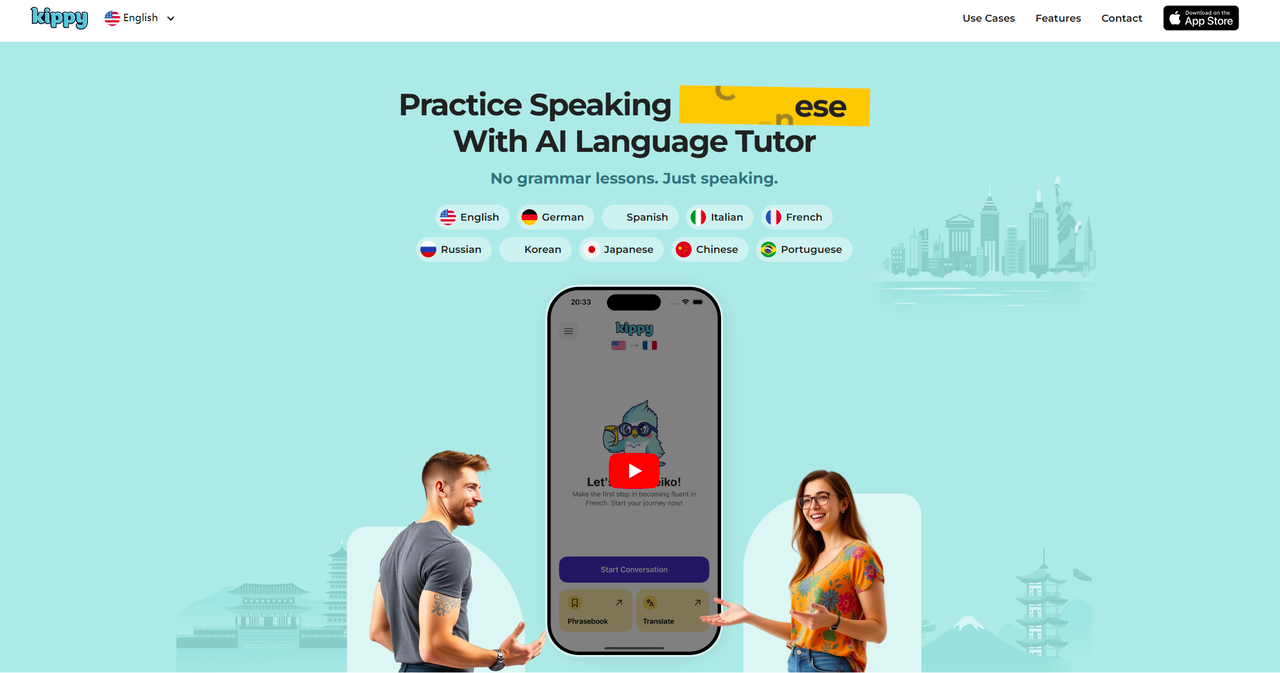Kippy AI Review: Smart Conversations and Learning Experience
AI language learning apps are becoming increasingly popular, and Kippy AI is one platform designed to help learners improve their speaking skills through interactive dialogues. But how effective is it compared to more advanced, adaptive platforms like Midoo AI?
What Is Kippy AI?

Kippy AI is an AI-driven language learning app focused on real-time conversational practice. Users engage with AI characters to simulate everyday interactions such as dining, travel, shopping, or casual social chats.
At the start, learners select their target language and preferred conversation topics. The AI provides dialogues aimed at being engaging and natural, helping users practice speaking in context.
However, Kippy AI’s conversations often rely on scripted patterns, and feedback is limited, reducing opportunities for deep personalization.
Features of Kippy AI
Kippy AI emphasizes interactive speaking through AI chat.
AI Conversations
Users converse with AI on a variety of topics. While accessible, the conversations are often scripted, limiting adaptability and challenge for intermediate or advanced learners.
Pronunciation Feedback
The app analyzes speech to provide basic pronunciation suggestions, catching clear mistakes but lacking detailed, personalized guidance.
Vocabulary Review
New words can be saved for later review, but the system is non-adaptive, offering limited reinforcement based on learner performance.
Multi-Language Support
Supports popular languages such as English, Spanish, French, and German, with easy switching.
Session Format
Sessions are short and structured, suitable for busy schedules but limiting immersive practice.
Pricing
Kippy AI offers free basic use with subscription plans for full features:
- Practice Speaking Premium$12.99
- Practice Speaking Weekly$5.99
- Conversation Practice Premium$79.99
- Learn English Premium$49.99
- Learn Languages Premium$79.99
- Language Learning$53.99
While reasonably priced, the limited adaptability and depth may reduce its value for learners seeking sustained improvement.
Pros & Cons of Kippy AI
Pros:
- Simple and easy-to-use interface
- Encourages conversation practice from the start
- Covers multiple common topics
- Supports several languages
Cons:
- Conversations often feel scripted and repetitive
- Feedback is basic and non-specific
- Minimal focus on grammar, listening, or writing skills
- Vocabulary review is static and non-adaptive
- Not ideal for advanced learners needing personalized progression
Midoo AI vs Kippy AI: Why Midoo AI Offers Smarter Learning

Kippy AI provides accessible conversational practice but lacks the adaptive and personalized approach offered by Midoo AI:
- Customized Learning Design: Midoo AI gathers detailed information about your learning goals, past performance, and weaknesses to create targeted warm-up exercises. Unlike Kippy AI’s static sessions, learning paths evolve in real time.
- Dynamic Scenario Adaptation: Midoo AI generates unscripted, real-world conversation scenarios that adjust in tone, vocabulary, and difficulty based on your performance. Role-playing and real-life unpredictability make practice more realistic and challenging.
- Long-Term Progress Tracking: Midoo AI monitors trends over time, identifies recurring mistakes, and schedules reviews to ensure cumulative learning. Kippy AI’s feedback is mostly session-specific and lacks this long-term strategy.
For learners aiming for continuous improvement and measurable progress, Midoo AI offers a smarter, more adaptive, and effective language learning experience than Kippy AI.
Other Popular Kippy Alternatives for AI English Learning
Learna AI – Learna AI emphasizes vocabulary growth and grammar accuracy through smart adaptive drills. Its AI engine tailors lessons to individual mistakes and learning pace. With a clean interface and clear explanations, it’s perfect for self-paced learners focusing on core language skills.
Teacher AI – Teacher AI delivers topic-based English lessons with conversational elements. It mimics one-on-one tutoring, allowing users to discuss real-life subjects while receiving grammar and phrasing feedback. The app bridges structured learning and natural conversation effectively.
Lucida AI – Lucida AI combines structured English lessons with adaptive progress tracking. The system personalizes exercises based on user performance, ensuring steady improvement. It’s best for learners who prefer a more guided learning path with measurable goals and organized lesson flow.
FAQs
Is Kippy AI free?
It has a limited free version; full access requires a subscription.
Can Kippy AI make me fluent?
Kippy AI is helpful for casual conversation practice but insufficient alone for full fluency.
Which languages does Kippy AI support?
English, Spanish, French, German, and more.
Why is Midoo AI a better choice?
Midoo AI delivers adaptive learning paths, dynamic real-time scenarios, and cumulative feedback for deeper, long-term language mastery.